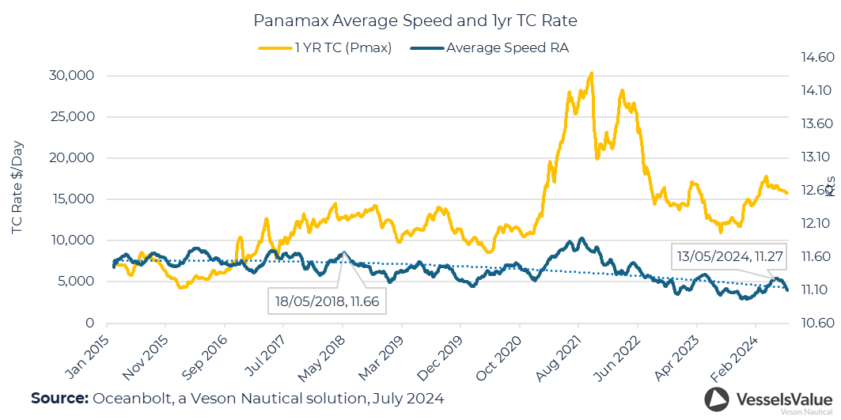
Decarbonization regulations are leading to a reduction in the average speed of the global bulk carrier fleet
3 months ago
Decarbonization regulations are leading to a reduction in the average speed of the global bulk carrier fleet

Research by Veson Nautical indicates that estimated carbon emissions from bulk carrier vessels have decreased by 5 million tonnes, or 2.5%, since early 2021, despite increased travel distances and time at sea. This reduction is largely attributed to the decline in average vessel speeds as operators comply with efficiency regulations set by the International Maritime Organization (IMO).
Oliver Kirkham, Valuations Analyst at Veson’s market intelligence arm VesselsValue, explains, “The cubic relationship between speed and required power means that higher speeds lead to disproportionately higher fuel consumption. Therefore, the steady reduction in average speed since 2021 has significantly contributed to the overall decrease in CO2 emissions.”
Specifically, the average speed of Panamax-class bulk carriers has dropped from 11.66 knots in 2018 to 11.27 knots in 2024 year-to-date—a decline of 3.3%. This occurs even as charter rates for these vessels soared to US$17,815 per day in April 2024, reflecting a 23% increase from the previous peak of US$14,500 per day in 2018.
Kirkham notes that similar patterns are evident in the Capesize and Supramax sectors, reinforcing the idea that reduced sailing speeds have been a key factor in the overall rise in operational efficiency across the bulk carrier fleet.
The whitepaper highlights that recent regulations aimed at lowering carbon intensity have been significant drivers of these changes. The introduction of the Carbon Intensity Indicator (CII) by the IMO offers a standardized measure of operational efficiency for ships, rating them based on fuel consumption, speed, and distance traveled annually.
As of 1 January 2023, the IMO mandated that all existing vessels calculate their Energy Efficiency Existing Ship Index (EEXI) to assess technical energy efficiency and report CII ratings. The EEXI framework requires shipowners to retrofit non-compliant vessels to meet stringent efficiency standards.
“For older vessels, installing engine power limitation (EPL) tools has proven to be the most effective and economical method to comply with new regulations, resulting in slower average speeds,” says Kirkham.
The report concludes that increasing pressure on shipowners to enhance fleet sustainability is leading to a two-tier charter market, where premium rates are offered for newer, less carbon-intensive vessels.
Kirkham adds, “Currently, 99% of active bulk carriers operate on single-fuel engines, which our verified model uses to estimate fuel consumption. This means that the impact of dual-fuel engines on overall CO2 emissions in the bulk carrier sector is currently minimal.”
Source: Container News